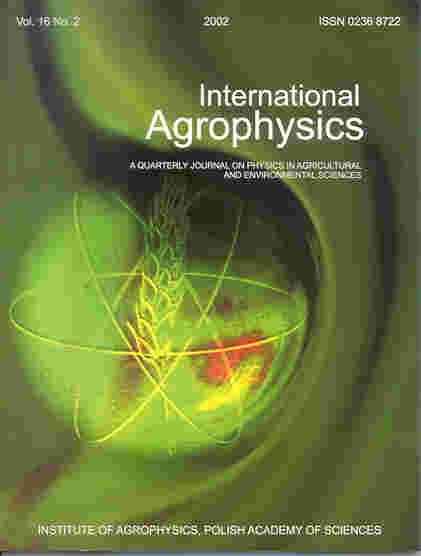|
|
|

|
|
| International Agrophysics |
| wydawca: | Instytut Agrofizyki
im. B. Dobrzańskiego
PAN
w Lublinie |
| ISSN: |
0236-8722 |
vol. 9, nr. 3 (1995)
|
|
|
poprzedni artykuł wróć do listy artykułów następny artykuł
|
|
|
Soil tensile strength as affected by time, water content and bulk density
|
|
| (pobierz wersję PDF ) )
|
|
|
D. Błażejczak1, R. Horn2, J. Pytka3
|
|
|
1 Institute of Agricultural Engineering, University of Agriculture, Papieza Pawla VI1,71-442 Szczecin, Poland |
|
|
2 Institute of Plant Nutrition and Soil Science, Olshausenstr. 40,24 118 Kiel, Germany |
|
|
3 Technical University of Lublin, Nadbystrzycka 36,20-618 Lublin, Poland |
|
|
vol. 9 (1995), nr. 3,
pp. 179-188
|
|
|
streszczenie
We investigated the effect of soil water conditions and soil compaction on the age-hardening process of loamy sand and silty loamy sand in relation to the tensile strength. Soil samples from Germany (loamy sand) and Poland (silty loamy sand) were moulded at water contents 10 %, 15 %, 20 % and compacted up to 1.35, 1.45, 1.55g/cm3. The samples were stored at constant water content. At intervals after moulding, the tensile strengths of the moist samples were measured with the indirect tension (Brazilian) test. The maximum aging time was 10 days. With increasing time the soils became stronger at the same water content. The higher the initial water content the less pronounced was the strength increase with time. Furthermore, increase in bulk density resulted in higher values of tensile strength. Two different mechanisms of age-hardening could be identified.
|
|
słowa kluczowe
soil tensile strength, Brazilian test, age-hardening.
|
|
|
|
|
|
|